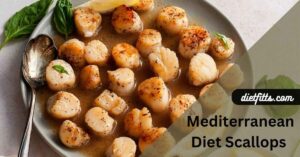Is Salsa Ok On Mediterranean Diet – Taste The Difference!
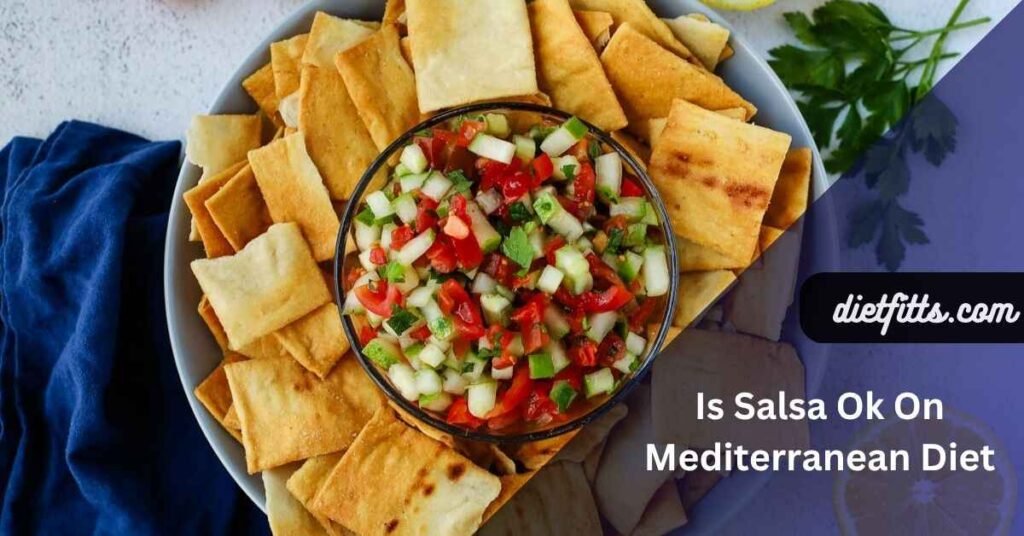
Looking to spice up your Mediterranean diet? Salsa adds a flavorful twist while keeping things healthy and delicious.
Yes! Salsa is a tasty and healthy choice for Mediterranean eating. Its fresh ingredients and rich flavors fit well into the Mediterranean diet’s focus on wholesome foods. Whether dipping, topping, or marinating, salsa adds a delicious touch to your meals while keeping them nutritious
This article will address your questions about “Is Salsa Ok On Mediterranean Diet.” and delve into its nutritional value. Trust me, you won’t want to miss out on this informative discussion!
Table of Contents:
What Is Salsa? –Need To Know!
Salsa is a tasty sauce that comes from Latin America. It can be chunky or smooth in texture. This sauce is typically made from tomatoes, onions, peppers, herbs, and spices. Even though salsa has many flavors, it’s not too high in calories and has good stuff for your body.
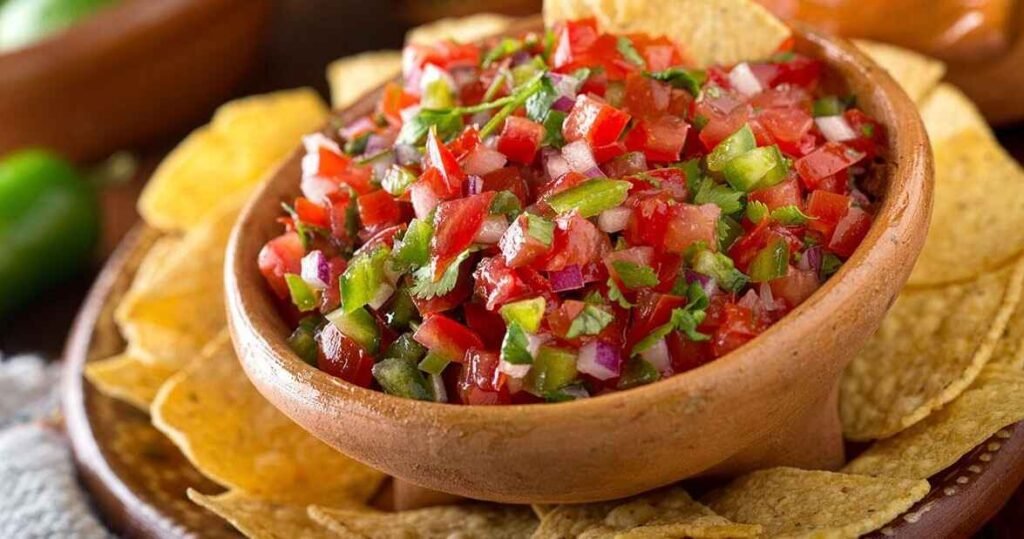
That’s why lots of people who care about being healthy like to eat it. You can use it as a dip with tortilla chips, sprinkle it on tacos, or marinate grilled meats with it. Its fresh and tangy taste profile appeals to people of all ages and backgrounds. And contributing to its widespread popularity in kitchens and restaurants across the globe.
Salsa And Mediterranean Diet Compatibility – Have A Look!
- Salsa is compatible with the Mediterranean diet.
- It contains fresh, plant-based ingredients like tomatoes, onions, peppers, and herbs.
- These ingredients have lots of vitamins, minerals, and antioxidants.
- The Mediterranean diet focuses on eating lots of fruits, vegetables, whole grains, and healthy fats.
- Salsa adds flavor to dishes without relying on unhealthy fats or excessive salt.
- It is a delicious and nutritious meal for those following a Mediterranean eating pattern.
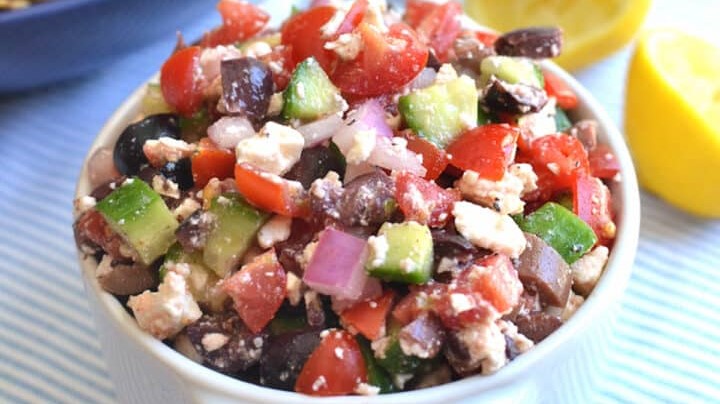
Also read: Is The Mediterranean Diet Gluten Free – Discover The Truth!
Benefits Of Is Salsa Ok On Mediterranean Diet – Let’s Explore!
Nutritional benefits:
- Enhanced Flavor Profile: Salsa adds flavor to dishes with its combination of fresh ingredients like tomatoes, onions, peppers, and herbs. Whether mild, medium, or spicy, salsa enhances the taste of meals and makes them more enjoyable.
- Nutrient-Rich Ingredients: Salsa is packed with nutrients, thanks to its primary ingredients. Tomatoes are rich in vitamin C, potassium, and antioxidants, while onions provide fiber, vitamin C, and various beneficial compounds. Peppers contribute vitamins A, C, and capsaicin, known for their potential health benefits. Herbs like cilantro or parsley add additional vitamins and minerals.
- Low-Calorie Option: Salsa is typically low in calories, making it an excellent choice for those looking to manage their calorie intake. In contrast to creamy sauces or dressings, salsa enhances flavor without adding many calories to your meal.
- Versatile Usage: Salsa is incredibly versatile and can be used in various ways. It can be enjoyed as a dip with tortilla chips or raw vegetables, served as a topping for tacos, grilled meats, or seafood, or used as a marinade to flavor dishes.
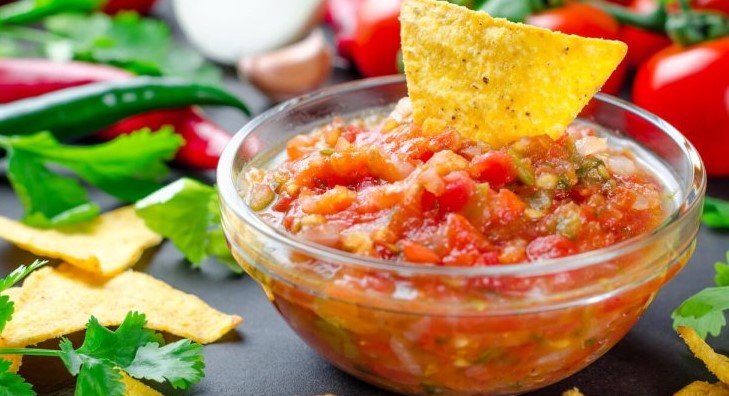
- Heart-Healthy Components: The ingredients in salsa, such as tomatoes, onions, and peppers, are heart-healthy foods. They contain nutrients like potassium, fiber, and antioxidants, which are beneficial for heart health and may help reduce the risk of cardiovascular diseases.
- Digestive Health Support: The fiber content in salsa, particularly from ingredients like onions and tomatoes, supports digestive health by promoting regular bowel movements and maintaining a healthy gut microbiota.
- Antioxidant Power: Salsa ingredients like tomatoes and peppers are rich in antioxidants, which help protect cells from damage caused by free radicals. Antioxidants are important for reducing inflammation and decreasing the chances of chronic diseases.
- Immune System Boost: The vitamin C content in salsa ingredients, especially tomatoes and peppers, contributes to a healthy immune system. Vitamin C is essential for immune function, helping the body fight infections and illnesses.
- Weight Management Aid: As a low-calorie, flavorful option, salsa can be a valuable addition to a weight management plan. It allows individuals to add flavor to their meals without significantly increasing calorie intake, making it easier to maintain a healthy weight.

Here you go! You’ve covered all the advantages of Is salsa ok on Mediterranean diet. Now, let’s look at some possible risks and considerations. Explore the additional Reddit link if you have any questions!
Risks and Considerations:
- Ingredients Check: When opting for salsa, it’s important to check the ingredients list, particularly in store-bought varieties. Some might have extra sugars, salt, or preservatives. That can affect their nutritional value.
- Dietary Restrictions: People with certain dietary restrictions or sensitivities should be careful when choosing salsa. They should check the ingredients to ensure they fit their needs, like if they need it to be gluten-free, dairy-free, or suitable for vegetarians.
- Spiciness Consideration: Spicy salsa variants may not suit everyone, especially those with gastrointestinal sensitivities. It’s advisable to moderate intake, particularly for individuals prone to digestive issues or heartburn.
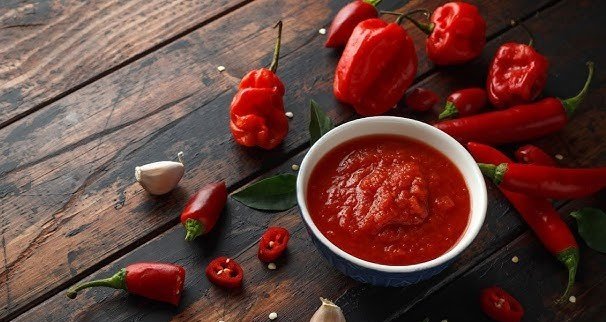
Also read: 7 Day Gluten-Free Weight Loss Diet – Have A Healthy Start!
Is Salsa Mediterranean Mexican Food? – What You Must Know!
- Versatile Condiment: Salsa, originating from Mexican cuisine, can be seamlessly incorporated into Mediterranean Mexican food.
- Common Ingredients: Traditional Mexican salsa ingredients like tomatoes, onions, peppers, and cilantro are also found in Mediterranean cuisine.
- Variations: Mediterranean-inspired salsas may include additional ingredients such as olives, capers, or olive oil. That adds a Mediterranean twist to the classic condiment.
- Flexible Usage: Whether used as a dip, topping, or marinade, salsa adds flavor and complements the fusion of Mediterranean and Mexican dishes.
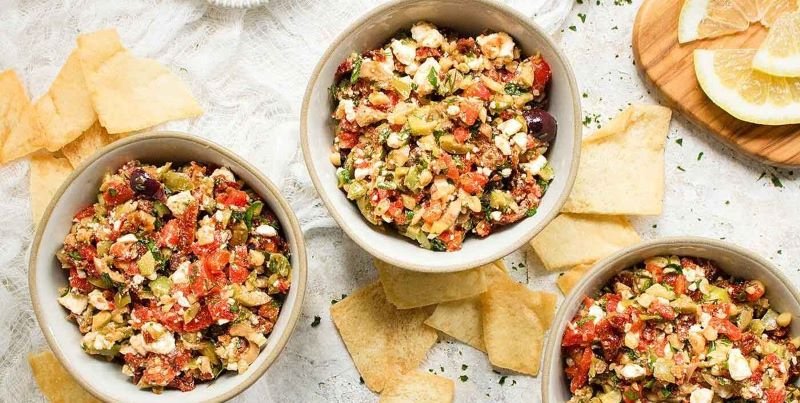
Mediterranean Salsa Recipe – Must Try It!
Ingredients And Their Alternatives:
- Tomatoes: Chopped cherry tomatoes bring the salsa a delightful, sweet, and tangy taste. If cherry tomatoes are unavailable, regular diced tomatoes can be used as an alternative. Note: I recommend not using canned tomatoes in this recipe for the best flavor.
- Cucumber: Chopped cucumber gives a cool and crispy foundation to the salsa. I like using English cucumbers because they have thinner skin and fewer seeds. If you don’t have cucumber, you can substitute with bell pepper or celery for a similar crunchiness.
- Olive oil: We use olive oil to make the salsa richer. Even though it doesn’t have a strong taste.
- It adds richness when mixed with the other ingredients.
- Mint leaves: Chopped mint leaves bring the salsa a fresh and bright flavor. If you don’t have fresh mint, you can use cilantro as a substitute.
- Lemon juice: Fresh lemon juice gives the salsa a zesty taste. It helps balance out the richness of the olive oil and other ingredients. You can use bottled or lime juice if you don’t have fresh lemon juice.
- Dried oregano: Dried oregano brings the salsa an earthy and fragrant flavor. It works well with other herbs, adding richness to the taste.
- Parsley: Chopped parsley gives the salsa a gentle, earthy taste, balancing the flavors and adding a fresh touch. You can use dill or chives if you need parsley.
I enjoy this salsa with pita chips, but you can also try it with tortilla chips. You can also serve it with flatbread or your favorite salad.
Frequently Asked Questions:
1. How do you make salsa less watery?
To make salsa less watery, you can start by draining excess liquid from the tomatoes after chopping them. You can remove the seeds from the tomatoes, as they contain a lot of moisture. Lastly, consider including diced onions, bell peppers, or cucumbers. These additions can soak up extra liquid also.
2. Can you eat Mexican food on the mediterranean diet?
Yes, you can enjoy Mexican food on the Mediterranean diet by focusing on fresh, whole ingredients and using olive oil for cooking. Incorporate traditional flavors like cilantro and chili peppers while limiting processed foods and saturated fats.
3. How do you spice up salsa?
Add ingredients like jalapeños, chili peppers, or hot sauce to spice up salsa. For extra heat and flavor, you can also experiment with spices like cumin, paprika, or red pepper flakes.
Conclusion:
Salsa fits perfectly into a Mediterranean diet. it’s made with fresh vegetables and herbs., The Mediterranean diet focuses on plant-based foods, healthy fats, and flavorful herbs and spices. That makes salsa an excellent choice for adding taste and nutrition to meals.

Hi! I’m Olivia Steeve, a certified nutritionist with over 11 years of experience in the field of diet and nutrition. At DietFitts, I focus on providing scientifically-backed, practical advice to help individuals achieve their health and fitness goals through balanced eating. I share insights, tips, and personalized guidance to help you make healthier choices and live your best life.

